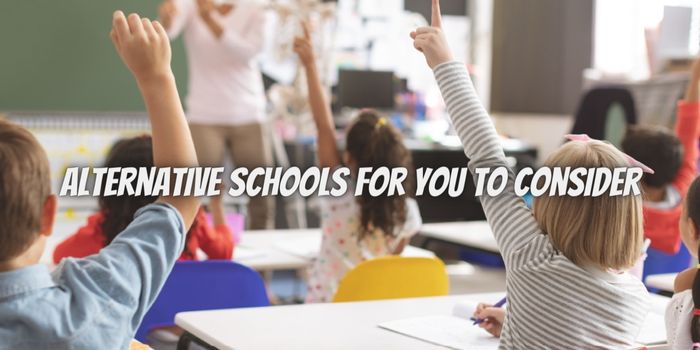If traditional schooling methods aren’t appealing, why not look into the innovative world of alternative schools?
Alternative schools are unique educational institutions that offer a wide range of innovative approaches to learning.
They provide students with personalized educational experiences that depart from traditional norms.
In this article, we will explore different types of alternative schools, offering essential information about each and how they can shape your child’s educational journey.
Let’s go!
Montessori Schools
Studies have found superior outcomes on academic and pre-academic assessments for children who attended Montessori preschool and elementary schools compared to non- Montessori students.
What’s the secret of their success?
Montessori schools have bolstered the philosophy of self-directed learning and independence, with students being encouraged to explore subjects at their own pace, harnessing their own grasp on studying and self-motivation.
Montessori offers multi-age classrooms, which creates a collaborative environment where older students mentor younger ones.
At the same time, it promotes a strong sense of community, guaranteeing hands-on activities and experiential learning, and allows students to engage with materials and concepts in tangible ways.
Waldorf Schools
Waldorf schools take a holistic approach to education by nurturing intellectual, artistic, and practical skills.
In Waldorf classrooms, technology is often limited in the early years, allowing students to focus on hands-on learning and human interaction.
Waldorf schools aim to cultivate well-rounded individuals who are academically competent and deeply in touch with their artistic and creative sides.
Waldorf believes that creativity, imagination, and artistic expression are essential for intellectual development.
Democratic Schools
Students at Democratic schools actively participate in decision-making processes, including setting rules and resolving conflicts–primarily emphasizing critical thinking, problem-solving, and social skills.
It differs from traditional education because it prioritizes individualized learning plans and recognizes that each student has unique needs and interests.
Students can explore subjects and activities that align with their passions, fostering a deep sense of autonomy and responsibility.
Sudbury Schools
Students at Sudbury get to study in a more liberal, non-curriculum environment that allows them to have a say in their learning schedule, which is proving to be beneficial.
And there are stats to back it up: 77% of Sudbury elementary students tested at or above the proficient level for reading, 75% tested at or above that level for math, 77% of middle school students tested at or above the proficient level for reading, and 72% tested at or above that level for math.
One of the school’s key benefits is that teachers are more like facilitators than actual educators, and they allow students to take charge of their education.
Also, there’s a democratic focus on decision-making within the school community, in which students have a say in how the school operates.
Homeschooling
As a non-traditional learning environment, homeschooling’s popularity is growing.
So much so that the homeschool population had been growing at an estimated 2% to 8% per annum over the past several years, but grew drastically from 2019-2020 to 2020-2021.
Homeschooling is beneficial for pupils who don’t thrive in the textbook learning environment because it provides flexible scheduling and pace, allowing students to focus on subjects that intrigue them, as opposed to a mandatory curriculum.
There are other benefits to this learning approach, including creating a close-knit, happy educational environment and building a stronger bond between parent and child.
Why Consider an Alternative School?
If you’re still on the fence about alternative schooling, here are some compelling reasons:
- Personalized Learning: Alternative schools tailor education to the individual needs, interests, and learning styles of students.
- Holistic Development: They often prioritize not only academic success but also emotional intelligence, creativity, and critical thinking.
- Unique Educational Philosophies: Each type of alternative school comes with its distinctive educational philosophy, allowing you to choose an approach that aligns with your values and goals.
- Escape from Conformity: Alternative schools break free from traditional constraints, offering an educational journey that encourages independent thought and innovation.
- Lifelong Learning: These schools instill a love of learning that extends beyond the classroom, promoting lifelong curiosity and personal growth.
We need to take a moment to focus on online safety, which is critical in this digital era, especially for students exploring alternative education and who need to protect their data and privacy while studying online.
One way to do this is through a Virtual Private Network (VPN), software that encrypts your internet connection, keeping your personal information secure. Once you learn more about VPN, you will realize how useful it is.
Conclusion
Gone are the days of set curriculums and the unrealistic expectation that students should excel at every single dictated subject.
Once you explore these alternative schooling methods, you are one step closer to bringing your child into a happier, healthier, more open-minded learning environment.




